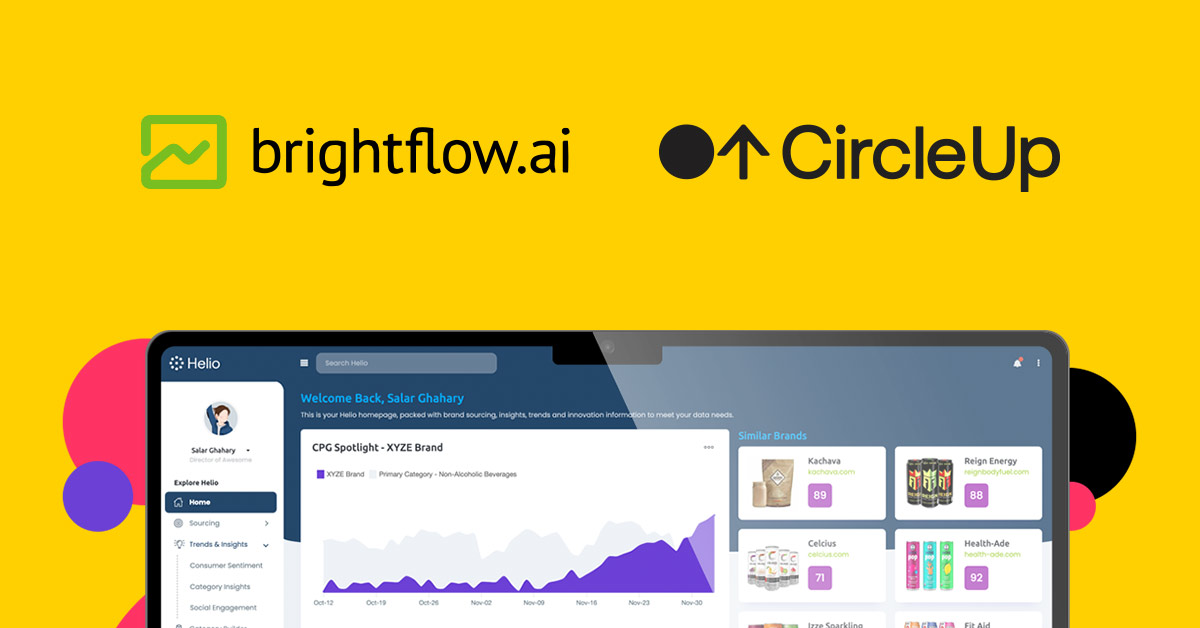CircleUp Sells, VC Fund’s Final Home Still Unknown

After announcing a serving agreement for its credit offerings in March, fintech platform Brightflow AI has acquired the remainder of lender, investor and software platform CircleUp with an eye on further monetizing AI-driven data and insights platform Helio.
Terms of the deal were not disclosed; however, Brightflow AI CEO and co-founder Robbie Bhathal told NOSH that, following the deal’s closure, CircleUp investors were now part of Brightflow AI’s own cap table and no cash was exchanged.
“They leveraged us for the servicing because of our data platform,” Bhathal said. “and now they’re adding their data system to ours. We’re going to bring better solutions for these owners [together].”
Several engineers from CircleUp have also joined the now 36-employee strong Bay Area-based tech company. Brightflow AI execs were unable to comment how the deal would impact the rest of the company’s workforce.
Discussions about a potential sale only began in earnest recently, Bhathal said, and came after the service agreement for CircleUp’s credit lending offering had been put in place. CircleUp executives did not respond to requests for comment about the sale.
“We are excited to create a new standard for financial intelligence for consumer companies,” said Ryan Caldbeck, chairman and founder of CircleUp, in the press release provided by Brightflow AI. “The acquisition by Brightflow AI allows us to provide customers with the data, insights, and tools they need to grow their businesses faster and more efficiently.”
Bhathal, a former CircleUp customer himself, said Helio will complement Brightflow AI’s existing data platform, which helps companies monitor their financial performance in real time. Specifically, Helio will be folded into Brightflow AI’s “forecasting” data capabilities, he said, offering businesses a more complete picture of their financial health, including insights into untapped white space or market trends.
Despite tracking over 1.6 million brands and 16 million attributes, some brands previously told NOSH it was difficult to gain sustained value from Helio given its price point and limited data set. Brightflow AI does not foresee this issue continuing to be a problem, Bhathal said, because the platform will no longer have to stand on its own, but rather will be part of a larger software offering that delivers value to customers in a number of ways.
“It’s great to get data, but you have to make data actionable, like what the hell do I do with it,” Bhathal said. “And so for us, that’s our AI … our platform is [the] ‘And then what?’”
The tech company’s user base of emerging and mid-sized brands also differs from Helio’s former target market of larger companies or investment firms. Because the two later groups already had access to a wide range of data, Bhathal said, it raised the bar for Helio to deliver results. Emerging brands, he believes, are more apt to place value on ease of use and speed of integration.
Brightflow AI utilizes a freemium model, offering a zero cost limited option that scales up to $5,000 per month for enterprise-level packages. Access to Helio capabilities, Bhathal said, will become a key sale proposition for paid product tiers and the company hopes to also add more offline data, such as retail-level sales data, to its platform.
Perhaps ironically for a data prediction platform, Bhathal attributes Helio’s own struggles to being too ahead of its time. The business also was another casualty in the ‘growth at all costs’ model that has recently fallen out of vogue in favor of an emphasis on smart financial choices, he noted. Over its decade-plus lifetime CircleUp raised over $250 million dollars. While Brightflow AI itself has raised over $19.2 million, Bhathal says the two-year-old company will hit profitability this quarter.
“[CircleUp] had the right models, and they had the right idea…they helped hundreds of businesses and founders actually succeed,” Bhathal said. “[But] when you’re in a business where capital and growth and certain financial metrics are important, and you have a lot of capital invested in time and liquidity, it just maybe was just the wrong place, wrong time.”
In addition to its venture backing, Brightflow AI also has received over a $100 million debt facility in order to “help small businesses grow.” Though the lending market is perceived to be risky right now, particularly for small businesses, Bhathal said servicing CircleUp’s credit offering has gone even better than expected. Half of the brands utilizing the credit platform have already integrated with Brightflow AI’s software, making it easier to spot potential financial problems earlier on.
“Consumers have a lot of [financial data] at their beck and call. Like ‘hey, your [credit] score went down, up,’” Bhathal said. But as a business owner, you don’t. And so just having those integrations done and having the visibility that these people have now, I think is like given a lot of the brands the solace in being able to make decisions faster.”
The remaining unknown for CircleUp is the future of its venture arm, CircleUp Growth Partners. Though portfolio companies had been told the book of business had been acquired by another firm, with the core investment team moving over as well, the specific acquirer has yet to be disclosed.
When reached for comment, a spokesperson for the investment group said they had no update at this time.
Brightflow AI, however, told NOSH that “CircleUp has spun off some of its other [smaller] assets to other partners.”
















